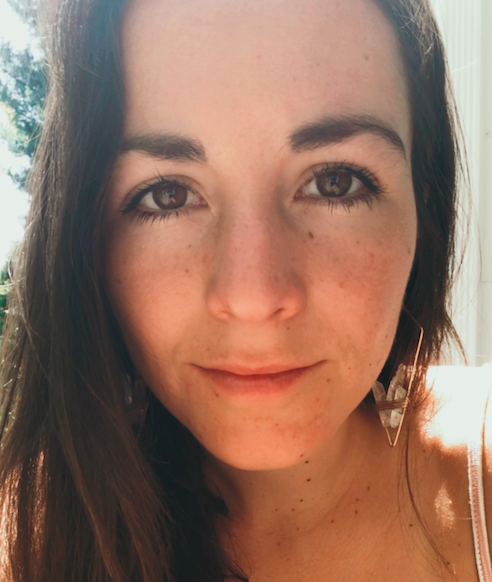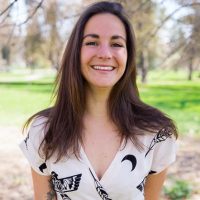Check out Elephant’s Continually-updating Coronavirus Diary. ~ Waylon
~
In 2017, I declared my life was over.
I looked nostalgically at old photos of myself before herpes simplex virus, and said goodbye to that “clean,” carefree girl.
In a single moment, I felt the confidence and independence I’d gained from years of solo travel dissolve. Across the world in Nepal, laying on a thin mattress, with a 104 fever, nerve pain down my legs, and the first signs of an HSV outbreak, I accepted defeat.
I was damaged goods. I had it coming. I should have known better. If only people knew the truth about this vicious virus that now made its home at the base of my spine. Forever.
It took a couple of years and a cocktail of numbing, avoidance, and bypass, to face my shame gremlins.
Now, I see herpes as one of the best things that’s ever happened to me. That’s not just a catchy headline. It’s the truth.
What felt like tragedy forced me to shed old stories and beliefs. Facing my fears exposed the most sacred parts of myself. I learned that my deepest shame was actually the source of my greatest power.
I healed by bringing dignity to my wound, and I remembered who I was. A woman with much more to say than I have a highly stigmatized STI. In October 2019, I launched the Living Brave podcast and publicly disclosed my herpes status.
Growth is hard because it involves letting go of narratives that we’ve held close for decades. They’ve been passed down from mother to daughter for centuries. A rule book unexamined, generation after generation.
Sometimes, it takes an emotional earthquake to uproot these stories, and even greater turmoil to finally adopt new ones.
I’m grateful for my herpes journey, not only because it guided me further into my purpose—work as an empowerment coach, activist, and speaker—but because it prepared me for the inevitable tumult that life presents us with.
Happy Three Years, HSV.
Here are some of the lessons I learned from an invisible virus:
Viruses don’t discriminate. People do.
Having a virus has nothing to do with your character. Period.
People of all ages, backgrounds, ethnicities, and identity intersections have contracted them, spread them, and in many unfortunate cases, died from them.
COVID-19 has more heavily impacted marginalized communities, not because of the virus itself, but due to the systems of privilege and power dynamics already pervasive in the United States and around the world. Those without access to supplies, healthcare, or the ability to social distance and work from home, are at greater risk of contracting and spreading the virus in their communities.
As with herpes, the dismal state of sex-ed is linked to the rapid spread of herpes, and the growth of its debilitating stigma. Without access to comprehensive sex education, at school or at home, healthcare, and specifically women’s healthcare, marginalized communities are again at the greatest risk.
Ignorance around viruses is dangerous and drives stigma.
Most people remain uneducated about HSV, although it’s as common as anxiety disorders in the United States. Little known facts about herpes include that condoms do not completely prevent it, it’s related to chickenpox and shingles, and that tests are inconclusive and expensive. Americans remain confused about COVID-19; what it is, how it spreads, and lack widespread access to testing.
One positive from this pandemic is that the world is getting a crash course in viral terminology. An asymptomatic carrier can have no physical effects and still spread a virus. This means that without testing for COVID-19 and HSV, you’re unintentionally putting others at risk. This is largely how viruses are contracted, driving the judgment that people spreading them are dishonest, irresponsible, and “dirty.”
Doctors will talk you out of getting a blood test for herpes (that’s right—your normal STI test does not include HSV) because the psychological impact is so much greater than the physical effect. I work with women around the world who have minimal physical symptoms and yet have cut themselves off from joy, connection, and love for years because of HSV.
Organizations such as Something Positive for Positive People, a podcast I was recently interviewed on, have risen in number as they fight to help reduce the high suicide rates for STI positive individuals. A common herpes diagnosis is the punchline of a joke for many, and the end of life, whether figuratively or literally, for too many innocent people.
When we treat viruses like cooties, we’re deaf to numbers indicating just how close they are to us.
We’re shocked when they enter our personal lives. One in two women will test positive for an STI before age 25, over half of Americans have HSV-1 (oral cold sores, and can cause genital herpes), and one in five in the U.S. has HSV-2 (genital herpes)!
An antibody test suggests that one in five New Yorkers may have had COVID-19, still less than the one in four in the Big Apple with genital herpes. The most notable difference here, of course, is the physical effect of the viruses. COVID-19 has a 3.4 percent mortality rate, per a WHO estimate in March.
Herpes can be uncomfortable, but you simply can’t die from the herpes virus itself. I sabotaged my life in many ways because of HSV, but I’ve never actually had a physical outbreak since my diagnosis.
When faced with something foreign, we want to explain it and protect ourselves. We turn away from truth and facts because we’re scared.
We resort to an “us versus them” mentality as a survival instinct, and we carry out habitual and harmful patterns of separating ourselves from what we believe may hurt us.
This explains why despite the rising numbers of COVID-19 deaths, many seem insensitive to the pandemic as they protest to quickly “open back up.” It also explains the rising xenophobia, hate, exclusion, and verbal and physical attacks against Chinese and other minority groups.
It explains why I can’t post on my social media with an #HSV2 hashtag without dozens of spam accounts immediately swarming to promise a “cure,” preying on people’s desperation and shame. Or why there’s been a sharp increase in calls for poison control centers after President Trump suggested injecting disinfectant could be an effective way to combat COVID-19.
I receive messages from people terrified that they will spread HSV-2 through their clothing or by shaking hands.
Viruses are contagious, and so is misinformation, especially when we’re in panic mode.
To dismantle the “us versus them” paradigm that we live in, we need a heavy dose of true compassion, a decentering from our narrative, and a recognition of our shared humanity.
Viruses don’t discriminate. People do.
Hardship exposes our deepest wounds.
I’ve seen two main responses to COVID-19. It’s activated compassion, inspired action, and generosity within many that are facing extreme hardship themselves. If you’ve tuned into the news over the past couple of months, you know the other type of response. Hoarding, blaming, shaming, discounting, and turning away from reality.
I won’t label either response as right or wrong, or say that I understand the bigger picture behind these reactions, but I will suggest that viruses expose what we’re made of. It shakes our cup and spills out whatever we’ve added to it over the years. We then have an opportunity to pause and decide what to pick back up.
Herpes simplex virus gifted me with a unique opportunity to explore my identity, biases, and insecurities. It shined a light on feelings of unworthiness. It was an opportunity to do the inner work required to feel whole again and show up fully for others.
Growth comes from uncertainty.
Everything that ever grew started as a small seed—buried in the forest, in the darkness, in the unknown. What I’ve learned interviewing dozens of individuals for my podcast Living Brave, is that many of the most important pivotal moments in our lives come from tragedy, loss, and a cloud of uncertainty.
When everything crumbles, and we’re unable to turn around because what’s behind us is in flames, we must evolve.
So as we find ourselves in a place that feels like the ground has been pulled out from under us and there is nothing to grasp on to, let’s aim for peace over happiness.
Through my role in helping women of diverse backgrounds reconnect to their truth, it’s become evident that at the core, we’re not so different. We may say we want a high-paying job, a passionate love life, a “perfect” body, or a big group of friends. But when we go deeper, layer by layer, we see that beyond the material, beneath the wish to be happy, we all just want to be okay with what is.
To navigate life’s inevitable ups and downs, as well as the moments we have no idea what direction we’re going, with grace.
My greatest vision for this world as we emerge from our collective pause is that we gain strength to hold onto the anchors of compassion, kindness, and generosity. That we realize we’re in it together, as we navigate choppy waters with no map, guide, or reference point.
May our shared humanity soften us, and lead us into a new, braver future.
Also worth a read:
Enough Bubble Baths. Enough Wine. Here’s what Coronavirus Self-Care really Looks Like.
7 Low Moments we’ll Experience during COVID-19 (& How to Deal with Them).
~











Read 42 comments and reply